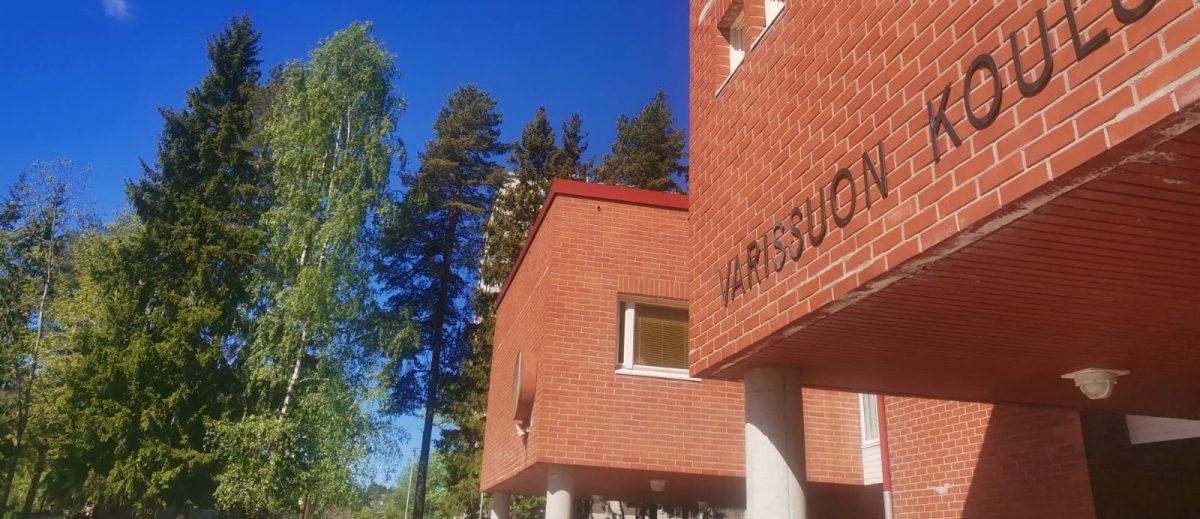Varissuo School is an elementary school in East Turku with classes from one to six. The school is located in a suburban area east of the city centre.It has about 200 pupils.
Moreover, there are 10 pupils in a preparatory class meant for those who have just moved to Finland and don’t know any Finnish language yet. These children learn the basics of the Finnish language and get acquainted with the Finnish school and society. The preparatory phase lasts normally half a year or one year.
The school aims to form a safe learning environment. The curriculum emphasizes co-operation with homes, good behaviour, responsibility in tasks and respect for other people and cultures. The school wants to provide the children with good basic skills, independence and joy for learning in co-operation with other pupils.
The personnel consists of the headmaster, 17 full-time teachers, mother tongue and ethnic supportive teachers, school assistants, a caretaker, a psychologist, a social worker, a school nurse, kitchen and cleaning personnel and a school carpenter.
Varissuo School is a multicultural school. More than 80% of the pupils have an immigrant origin. This makes the school life international and special. The most frequent mother tongues after Finnish are Albanian, Arabic, Somali, Kurdish, Russian, Vietnamese and Estonian. Altogether the pupils have 12 different mother tongues.
The large number of immigrant pupils is a challenge for the school. Therefore we have some special arrangements to help us in the daily work. The level of the Finnish language of many immigrant pupils is elementary. Therefore they have difficulties in using Finnish as their language of study. We have employed special personnel to help the pupils in reaching the aims of the class and learning Finnish more efficiently.
We have a Finnish as a second language teacher to teach vocabulary, concepts and Finnish grammar systematically. A Finnish supportive teacher helps to understand the contents of the subjects and to explain the new vocabulary and the necessary concepts within the subject-matter. There are also native language speaking supportive teachers from each of the bigger ethnic group to help with the contents. Typical subjects for supportive teaching are science, history and maths. Each class teacher has also a possibility for giving extra supportive lessons for those who have lived in Finland less than 4 years. There is also a variety of school assistants with different ethnic backgrounds and mother tongues to help in the daily communication and tasks.
In everyday life at school we learn to accept different people and respect everybody’s cultural background. We teach the immigrant pupils to be positively multicultural, members of both their own culture and the Finnish culture in harmony. To strengthen the own cultural background the mother tongues are taught two lessons a week. It is voluntary, but recommendable.
Varissuo School has one special teachers to help the pupils in learning difficulties. They concentrate on traditional reading, writing and speech problems, mathematical difficulties or acute social problems. This special aid is meant for pupils from all nationalities.
In Finnish schools Religion is a school subject. Historically almost all Finns belonged to the Evangelic Lutheran church (or the Greek Orthodox church in East Finland ). Thus the religion was the same to everybody in the region. The situation has now changed and we teach a variety of religions. At Varissuo School a notably big religious group is Islam. Those who don’t have any religion study General Ethics instead.
About Finnish Schools
Schools in Finland are normally maintained by the municipality. They are totally free of any charge for the children, who get the books and pencils form the school, a warm meal every day and a free medical care.
The school days in a primary school are normally between 8 a.m. and 2 p.m. The first-graders have 19 lessons a week, the sixth-graders 25. They are supposed to do some homework for each day.
Class teachers normally give 24 lessons a week. The rest of the work they can do outside the scheduled lessons when and where they choose. Teachers´ meetings are obligatory, however (max. 3 hours a week for consultative and planning work), plus 2 Saturdays a year for the teachers’ own educational purposes. The teachers don’t have an exact working time, but they have a total responsibility of their teaching and class instead. The class teachers as well as the subject teachers have a higher university education. Most teachers in Finland belong to the Teachers’ Trade Union.
The Autumn term starts normally in the middle of August and lasts until Christmas. At the end of the term there is a Christmas festival. In October there is an Autumn holiday, which lasts a couple of days or a week depending on the decision of the local authorities. Independence day on the 6th of December is a day off. Schools often celebrate Independence Day with special festivities. The Spring term starts at the beginning of January and lasts to the end of May. In February there is a sports holiday of one week, On the 28th of February schools often celebrate the Finnish national epos Kalevala with national programme. At Easter there are two extra days off.The First of May is also a national holiday. Before Summer holidays schools normally organize a Spring festival. Summer holidays last 2 months and a half. The teachers have equally long holidays with the pupils.
